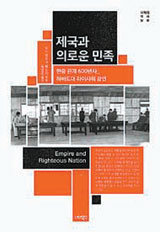Grim lessons from history
Grim lessons from history
Posted February. 26, 2022 07:40,
Updated February. 26, 2022 07:40

Liberal international political scientists, who support the so-called ‘democratic peace theory’ that democracies are hesitant to engage in armed conflict with other identified democracies, always raise questions about international relations in East Asia. They say it is strange even from a realist perspective that South Korea and Japan do not pursue a balance of power by solidifying against China, which seeks to achieve regional hegemony. The variable called ‘history’ is behind this question. That is thousands of years of exchanges with China and the invasion of Japanese imperialism after late 19th century.
In this book, the author, who became well-known as a world-class war researcher for his work “The Global Cold War,” pays attention to the unique relations between the two countries by looking back on the 600 years of Korea-China relations. The word “righteousness,” which appears in the title of the book, is a Neo-Confucian concept that pursues righteousness through vertical order. The author believes that the concept created “complex sovereignty” in Korea-China relations. Complex sovereignty is vertical tribute order that emphasizes courtesy to a dominant state while guaranteeing complete autonomy in the internal affairs of a vassal state. The author thinks that this was a key factor that brought peace in East Asia for hundreds of years before the 19th century.
However, as the national power of Korea and China grew and modern nationalism strengthened, it became difficult for such cooperative system to work. Furthermore, conflicts between the U.S. and China even intensified amid North Korea nuclear crisis, intensifying tension on the Korean Peninsula. The author says that the patriarchal perception that China has traditionally had towards the Korean Peninsula can begin to work in a sudden change of situation, such as the collapse of the North Korean regime. It means that China is highly likely to intervene militarily in order to secure a buffer zone at its border with North Korea.
If so, which direction South Korea should be headed in the 21st century, when the two countries can never return to the old tribute order? The author pays attention to the perception of the Joseon elites, who understood the Qing Empire more accurately than the Chinese people. In the end, would it not be the priority to clearly understand the intention of neighboring countries rather than unconditionally chanting anti-China or anti-Japan slogans?
Sang-Un Kim sukim@donga.com



![월 800만 원 버는 80대 부부 “집값만 비싼 친구들이 부러워해요”[은퇴 레시피]](https://dimg.donga.com/c/138/175/90/1/wps/NEWS/IMAGE/2026/02/13/133363096.4.jpg)



